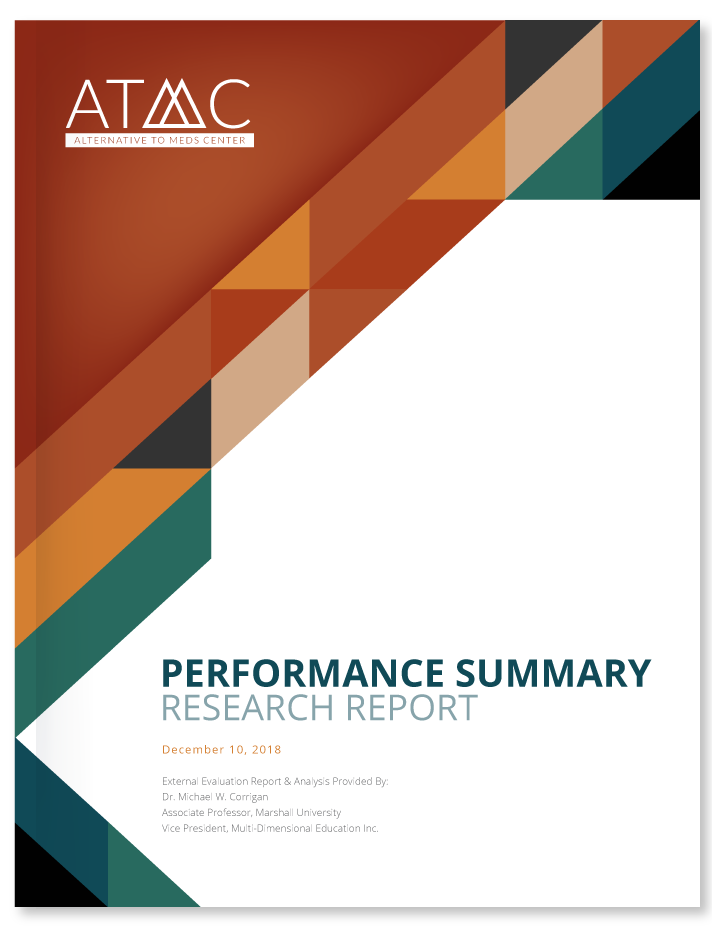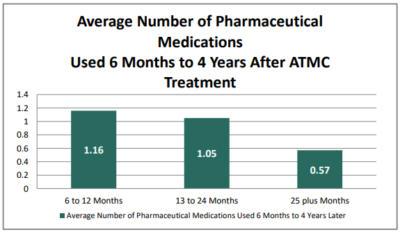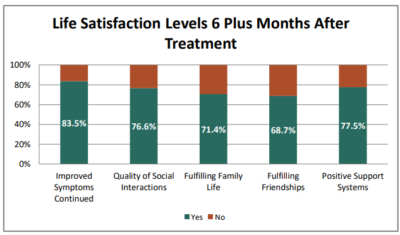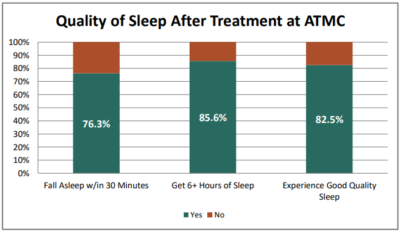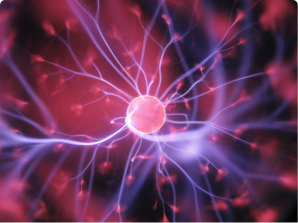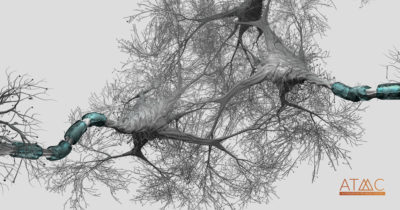Alternative to Meds Editorial Team
Written by Lyle Murphy, Founder
We use diagnostic tests to ascertain which treatment protocols will work best for the individual while taking into careful consideration each person’s unique state of health, diagnosis, personal preferences, characteristics, and values.
Science and technology provide the answers, but how we apply them to each client must ebb and flow with personal changes in everyday life and exposure to stress.
The goal of our evidence-based approach is to eliminate unsound, ineffective or potentially risky treatment methods in favor of those that have consistently shown to provide better, more reliable, and safer outcomes. Success is evident in the lasting recovery of our clients, revealed in this 2018 Outcome Study.
PERFORMANCE SUMMARY RESEARCH REPORT
External Evaluation Report & Analysis Provided By:
Dr. Michael W. Corrigan
Associate Professor, Marshall University
December 10, 2018
This report is based on analysis of longitudinal data collected by the staff at the Alternative to Meds Center (ATMC). The data file consisted of information collected during a client’s care at ATMC, as well as follow up survey data. Post-test surveys seeking to document the extended effectiveness of ATMC treatment efforts were sent to approximately 300 clients who met the parameters of completing the treatment program and being out of care for more than six months. A total of 103 clients responded, equating to a 34% response rate (more than twice that of typical industry standards for survey response rates). After an extensive review of the data set and ATMC’s efforts, the research questions to follow were developed in collaboration with the external evaluator and ATMC staff. This research summary documents statistically significant evidence supportive of the admirable goals ATMC seeks to accomplish for their clients, as well as identifies information for continuous improvement efforts to better serve future clients.
Research Question 1 (RQ1): Is treatment at ATMC effective in helping clients?
The answer is a definitive yes. And the following research questions are designed to answer in which specific ways ATMC is effective in helping clients.
RQ1a: What percentage of ATMC graduates/clients succeed in staying med free for more than six months after their residential treatment period (by pharmaceutical category)?
✓ Research documents ATMC’s success rate, for helping clients become and stay med free, to be as high as 87.5%.
 Results suggest that ATMC is experiencing great accomplishment when it comes to the success rate of helping clients discontinue the use of pharmaceuticals and remain med free for extended periods of time; ranging from six to forty-seven months.
Results suggest that ATMC is experiencing great accomplishment when it comes to the success rate of helping clients discontinue the use of pharmaceuticals and remain med free for extended periods of time; ranging from six to forty-seven months.
RQ1b: Is the reduction in medication use after ATMC treatment statistically significant?
✓ Yes. With a confidence interval of 99.9%, research documents that ATMC’s holistic treatment process can reduce with statistical significance a client’s dependency on pharmaceuticals, if not eliminate use entirely.
✓ A paired sample t-test identified statistically significant decreases in the number of medications being used from intake (M = 1.66, SD = 1.17) to discharge from ATMC (M = .63, SD = .86), t(94) = 9.43, p < .001.
✓ A paired sample t-test also identified statistically significant decreases in the number of medications being used from intake (M = 1.66, SD = 1.17) to post-test assessments gathered six to 47 months after leaving treatment (M =.63, SD = .88), t(79) = 6.33, p < .001.
Clients entering ATMC with varying degrees of pharmaceutical drug dependency reported a range of one to four categories of drugs being used inclusive mainly of benzos, antidepressants, antipsychotics, mood stabilizers, and various other pharmaceuticals (M = 1.66, SD = 1.17). At the time of discharge from ATMC, though some clients due to safety efforts encompassing drug tapering plans were still on up to four medications, the mean number of pharmaceutical drugs reported being used dropped to .63 (SD = .86). And after being away from ATMC for six months to four years, respondents reported a mean usage of .63 (less than one drug) (SD = .88). A total of 59.8% of respondents reported not taking any medications at the time of the post-test assessment. Please note, however, 20.7% reported being on one pharmaceutical medication at post-test, as well as 15.9% reporting the use of two medications and 3.7% reporting the use of three medications. Please note that medications being used at the time of post-test were identified in the vast majority of cases to be respectively less dangerous and addictive medications as well as taken in lower dosages than what clients entered ATMC being dependent upon.
RQ1c: Does the ATMC treatment process have evidence of being long-lasting?
✓ Yes. For the large percentage of clients who are able to dramatically reduce or end their pharmaceutical dependency during the ATMC treatment process, Analysis of Variance (ANOVA) performed documents that the results are long-lasting.
✓ Trending data also suggests that the more time away equates to continued reduction in pharmaceutical medication use.
To explore if the number of weeks away from ATMC after treatment had an impact on effectiveness to reduce pharmaceutical drug use, an Analysis of Variance (ANOVA) was performed. Results documented there were no statistically significant differences between clients grouped by six to 12 months, 13 to 24 months or more than 25 months, F (2, 77) = 1.28, p = .28. Considering this analysis shows no significant differences between clients six months to four years after treatment and a trend showing consistent further reduction in medication use as time has passed, the effectiveness of ATMC’s efforts show evidence of being long-lasting.
RQ1d: How does the success of ATMC treatment efforts relate to life satisfaction variables after treatment at the center?
✓ For 83.5% of clients, the improved symptom levels experienced before
graduating from ATMC have continued for six months to four years.
✓ 76.6% of ATMC clients report experiencing positive social relationships and
interactions in life after graduating.
✓ 71.4% of ATMC clients report having a fulfilling family life after graduating.
✓ 68.7% of ATMC clients report having fulfilling friendships after graduating.
✓ 77.5% of ATMC clients report having positive support systems after graduating.

RQ1e: Do clients experience quality sleep after their care at ATMC?
✓ More than 76% of ATMC graduates report experiencing quality sleep patterns continuing six months to four years after residential care.

RQ1f: What is the overall satisfaction level with ATMC services?
✓ On a scale of 1 (very dissatisfied) to 10 (most satisfied), clients reported a median score of 8; with the most frequent answer being a 10 out of 10.
End of Study
